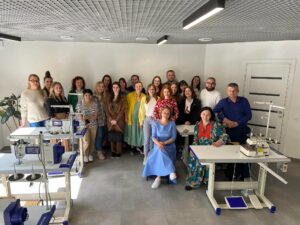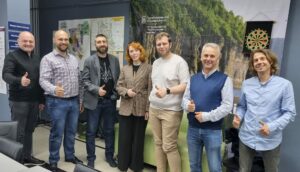Ukrainian garment businesses and all stakeholders involved in the industry face everyday risks along their supply chains. They are facing decreasing sales, lack of employees, and physical safety of their premises and teams. Nevertheless, the cooperative spirit of participatory garment industry projects is building a better future for the Ukrainian industry and, generally, the national economy. Stories of fashion clusters that employ cooperative principles in Ukraine are worth sharing to understand the approaches to business for supporting each other and contributing to humanitarian needs in times of war.
Liuba Ustinova, Executive Director, West Ukrainian Fashion Industry Cluster:

New group launch at Lviv Innovative School of Tailoring
Since the beginning of the war, the cluster has adjusted its activities to the new needs. To promote employment and other business creation – both for the local population and internally displaced people – we have accelerated the Lviv Innovative School of Tailoring activities. The project has already done some work before: we have updated the program, received support in providing premises and equipment, as well as funding for tuition fees, received from the Jagiellonian Foundation and Polish Aid together with the Ministry of Foreign Affairs of the Republic of Poland. We also received assistance from the Lviv City Institute. As a result, the best tailoring teachers have started training 12 participants with diversified backgrounds (out of a total of 180 applications) over the next 2.5 months. Also, during the war, the sales market challenges have become especially acute, so we are designing a project now to assist with exports for Ukrainian garment businesses.
We believe in building cluster capacity to support the fashion business. Our team is participating in a UNDP project to master cluster management tools. We will participate in a consortium of organizations that will unite efforts and create a common interaction platform for businesses and donors. Additionally, we will launch service contracts for small and medium business consulting.
Oleh Demchuk, Coordinator, Podillia Fashion Cluster:

Podillia Fashion Cluster members at a work meeting
We call ourselves a cluster born during the war, as that was because of war that Ukraine’s sewing companies have faced sudden challenges with the supply of fabrics, lack of employees, a radical change in demand. It was not up to fashion trends – instead, everyone rushed to do something for urgent humanitarian needs. We especially appreciate that the joint efforts of cluster members do everything: for example, participating companies help each other with digitizing patterns and with important supplies.
The cluster is composed of seven members and five candidates. Our community is designing a clear platform based on the requirements and operating principles. We are now at a stage of methodology design, networking, price strategizing, and inter-cluster interaction. The cluster team has developed a memorandum of 12 cluster principles, regularly conducts strategic facilitation sessions, and describes and plans operational processes. Cluster members agreed to comply with the exact manufacturing cost and clear deadlines.
The «Astar» Sustainable Development Agency is also a cluster member acting as cluster broker/ manager. In the last three months, the agency has reached a Polish donor who helped in covering the cost of a large consignment of sewing fabric. The cluster concept was presented to the European Cluster Alliance and German partners, who agreed to donate some of the yarn for knitting. In addition, GIZ is helping the cluster in purchasing equipment, and USAID provides orders for producing bed linens for IDPs and clothing for children, women, and men.
To understand the need for cluster formation, one should consider that, in terms of the concentration of the region’s population involved in the garment business (35 thousand people out of 270), the city of Khmelnytskyi (cluster center) takes a leading position in Ukraine.
The cluster’s experience includes two attempts to launch sewing clusters with EBRD support in 2018-2020, namely, Podillia Wedding Group (cluster of wedding clothing manufacturers with six member companies) and Podillia Women Apparel Club (an association of women clothing manufacturers, joined by 15 companies). The cluster team has prepared numerous marketing studies, participated in trade shows, and exhibitions, and had training in marketing, design, and lean production.
Project participants of the “Supporting Economic Prosperity for Women and Internally Displaced Persons in Ukraine” (SEW Ukraine) project is facing the same challenges.
The SEW Ukraine project fosters economic prosperity for vulnerable women, including Internally Displaced Persons (IDPs), living in 8 oblasts of Ukraine by addressing the barriers limiting their full and meaningful participation in Ukraine’s workforce. Project participants are supported through access to employment in the garment industry, vocational training, workplace integration training, and the development of ancillary services such as shared childcare facilities. Higher-skilled women beneficiaries are supported to establish new micro, small, and medium-sized enterprises (MSMEs). Women who own or manage MSMEs are provided with tailored capacity-building support, incl. business management training enhanced access to loans for increased competitiveness and the formation of cooperatives to advance sustainable, profitable, and gender-equitable businesses.
The SEW Ukraine project team is adjusting activities to address current needs and increase the level of economic confidence among women affected by hostilities. Therefore, cooperative development training was conducted as the first project event since the beginning of the full-scale Russian military invasion of Ukraine. Business skills training in a hybrid format (online, May 30-31, 2022) was also organized for women who would like to establish or restart their sewing microbusinesses and discover the advantages of the cooperative business model for their professional and business development. Besides cooperative development, the event discussed pricing strategies, business registration and financial accounting, and marketing instruments for apparel promotion.
Maksym Filiak, Country Manager – Ukraine, CDF Canada
The SEW Ukraine Project plans to help build a better future for project participants, sewing businesses, and cooperatives. The project will include training and consultancy support for restarting garment micro businesses at new locations, and support participants by providing small equipment for home-based sewing microbusinesses. Moreover, SEW Ukraine project is continuing the operationalization of cooperatives, vocational and technical training in the garment value chain, gender-responsive garment industry practices, marketing, and environmental initiatives.